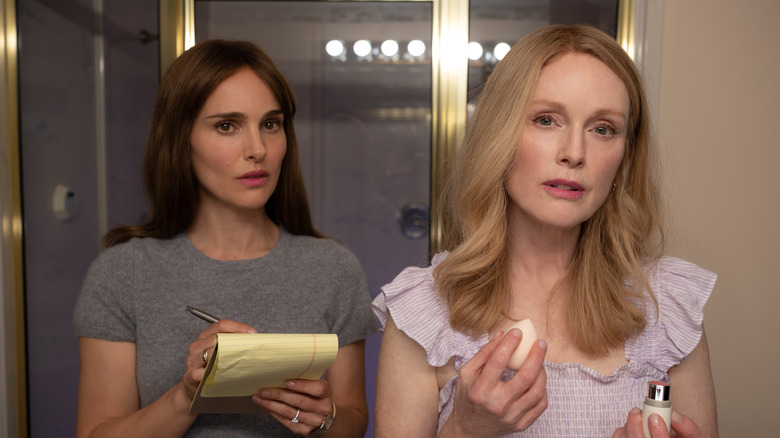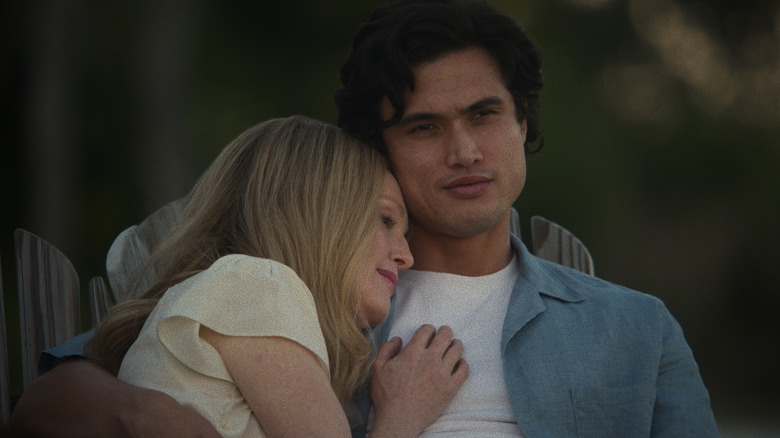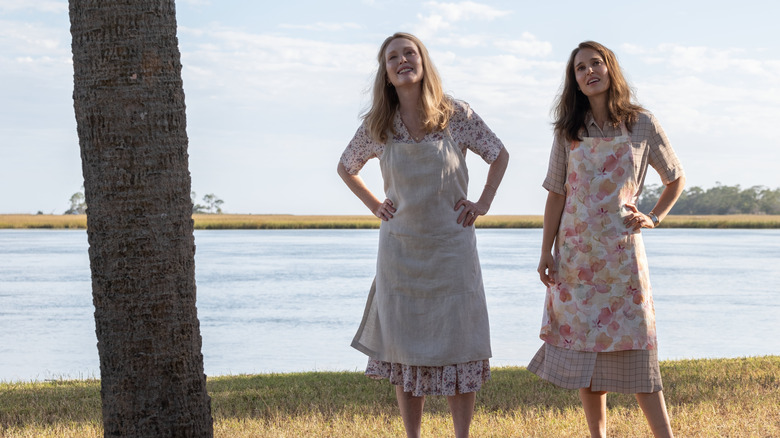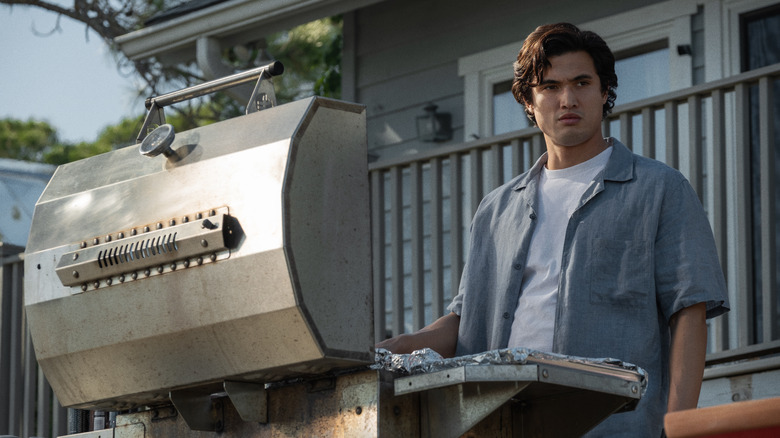The Ending Of May December Explained
Contains spoilers for "May December"
Writer-director Todd Haynes returns with "May December" and delivers a darkly comedic power struggle between two women desperate to maintain their sense of control and truth. The film follows Elizabeth (Natalie Portman), an actress who's living with married couple Gracie (Julianne Moore) and Joe (Charles Melton) to do some research on them for her next film. Years prior, Gracie and Joe's relationship was at the center of a tabloid frenzy but now they've been able to maintain their love and build a family. However, Elizabeth's presence and persistent questioning cause old wounds to open up and incite a major power struggle surrounding the truth.
With "May December," Haynes unleashes some sharp dark comedy and captivating performances on audiences through a story that evokes some thought-provoking concepts tied to our perception of the truth. As Elizabeth interacts more with Gracie and Joe as well as their family, she causes fractures that allow old issues and feelings to rise again. It all builds to a riveting finale that has some hilarious moments and tense confrontations. Plus, there are some intriguing themes and connections to modern conversations about truth-seeking and what it's like to seek normalcy after a major scandal. So let's delve into all the wild moments and realizations in the ending of "May December."
What you need to remember about the plot
Before we get into the nitty-gritty of the film's finale, let's go over some important details in the story. Elizabeth is set to shadow Gracie to learn more about her since she's going to be portraying her in a movie based on Gracie's controversial relationship with Joe. Many years ago, Gracie and Joe started their relationship when they both worked at a pet store together — when Gracie was married and Joe was 13 years old. When their relationship was discovered, Gracie was sent to prison and was forced to have their baby while in jail. After Gracie was released, she and Joe continued their relationship — despite public backlash and a wild tabloid following — and now have a family together.
With Elizabeth's arrival to learn about Gracie and the ins and outs of her relationship with Joe, Gracie and Joe's relationship is tested. Elizabeth's persistent prying into their past to find the truth causes some ugly aspects of their past and unresolved feelings to resurface. Not to mention, Elizabeth's willingness to cross moral lines to find inspiration — including flirting with Joe and talking to Gracie's former family — makes things much tenser between her and Gracie. Eventually, she's able to tap into Joe's lingering desire to explore relationships outside of Gracie and engages with him sexually to gain access to a letter Gracie wrote to him.
What happened at the end of the movie
After Elizabeth obtains a letter that Gracie secretly wrote to Joe years ago, she recites it to immerse herself deeper into Gracie's mindset. While she sees some genuine success, Joe is in turmoil and has a new perspective on his relationship with Gracie. Although Joe has been happily invested in his relationship with Gracie, his sexually charged encounter with Elizabeth has unearthed feelings of curiosity in Joe that he finds hard to ignore. With him being too young to suddenly be an empty-nester, Joe realizes how much of his life is ahead of him yet also sees how constrained he is by this relationship with Gracie.
Unfortunately, Gracie doesn't want to understand this and continues to position herself as a victim in this relationship — detailing what she sacrificed and how frustrated she's been by Elizabeth's presence and influence. All of that pent-up frustration makes the tension incredibly high the next day as Gracie is absent the morning of her kids' graduation. She's gone hunting with her dogs, and that big gun in her hand after that confrontation with Joe makes you wonder what or who she's hunting. Those fears ultimately lead to nothing, though, as both Gracie and Elizabeth appear at the graduation showing some personal happiness — Elizabeth's happy she got what she needed for the movie, and Gracie's happy that she's leaving. The film ends with Elizabeth performing a scene as Gracie — feeling the realism of her own performance setting in with each take.
What does the end of the movie mean
Although everyone seems fine by the end of the film, there are many changes that have occurred within these characters. Elizabeth has gained all the material and inspiration she needed from Gracie and Joe for her role. She was able to dig deep enough into their lives — even in ways Gracie wished she wouldn't — and even obtained a secret letter that could lead to some game-changing success in her career. Who knows if this role as Gracie will lead to anything worthwhile for Elizabeth, but it's clear that she has all she needs to deliver the best performance possible. And the final scene shows that she's already finding ways to tap into the raw emotions of Gracie and Joe's story.
As for Gracie and Joe, their relationship seems to be in an okay place. We don't see them break apart or even cold toward each other at the graduation. But there's no way that they will move forward the same way after this experience. Joe's realization about his buried feelings in their relationship will certainly change his perspective now that it's just him and Gracie at home. And although Gracie won't show it, she's definitely been rattled by Elizabeth's impact on her life. While this encounter was initially just a simple research project, it's going to have lasting ramifications on Gracie and Joe and their dynamic as a couple.
Another possible explanation
A key aspect of what makes "May December" such a compelling watch is how it maintains a sense of moral ambiguity when it comes to Gracie and Elizabeth. Instead of declaring a position on whether Gracie and Elizabeth's actions make them good or bad, Haynes and his film take a clearly objective stance to let viewers decide for themselves. When it comes to Elizabeth, viewers can debate if her actions cross the line and if she carelessly interferes in Gracie and Joe's relationship to further her own career. And regarding Gracie, viewers can determine for themselves how genuine her actions and depictions of herself are and the legitimacy of her continued resilience regarding people's condemnation of her and her relationship with Joe.
The film allows viewers to form their own perceptions of these characters and their actions — which results in a self-reflective experience. "May December" is a timely story about what's real and who you end up believing. Whether it's celebrity break-ups or some kind of tabloid scandal, there are always multiple versions of a story.
Post-scandal living
Gracie and Joe's relationship in the film helps show what life after a major scandal can be like for those involved — and it's not always pretty. Although these two have managed to stay together after all this time and have started a thriving family together, there are some internal and external signs that prove this life isn't easy. Though their days in the tabloids ended many years ago, they still receive packages filled with poop from detractors. Since they still live in the same town, Gracie and Joe still run into Gracie's ex and her children with him — which leads to tense and awkward interactions. Plus, who knows how the circumstances and knowledge of Gracie and Joe's relationship affect their children and their social lives at school and in the community?
The lives of Gracie and Joe have changed dramatically as a result of their time in the limelight, and they have to be careful of any interaction they have since the mere mention of their history as tabloid stars could instantly change others' perceptions of them. Yet they've still been able to create their own space and live the lives they want to. They're able to take care of their kids and love each other without much interference — this is one of the ways in which the film shows how someone can healthily recover from being at the core of such a blistering scandal.
Joe's perspective
Compared to Gracie and Elizabeth, Joe has a unique perspective and arc within the film that relates to untapped feelings he's had in his relationship with Gracie. While Joe is shown to be quietly happy in his life, it's obvious to everyone else that he's grown up faster than others his age. He's now been married for the majority of his life and is about to become an empty nester — something most parents his age won't experience for another five to 10 years potentially. In some ways, Joe can be seen as silently going through a midlife crisis due to experiencing these milestones at such a young age — which causes these dormant feelings to eventually boil over.
After having a short sexual experience with Elizabeth, it dawns on Joe that he doesn't feel like he's experiencing his life to the fullest and is constrained in this relationship with Gracie. This doesn't mean that he doesn't love Gracie anymore, but he's instead gained a new perspective on himself that makes him feel the need to explore himself more outside of this relationship. Joe's experience is relatable to anyone who grows up too fast and finds themselves questioning everything after they're suddenly about to enter a new phase of life far too early.
Opening old wounds
Another big element of Joe and Gracie's relationship is the painful and powerful impact opening up old wounds can have. Prior to Elizabeth's arrival, Joe and Gracie were relatively happy in their life together — raising their family and creating a generally isolated space to escape their gossip-filled past. However, once Elizabeth enters their lives and starts to dig into their past, they're forced to open those old wounds. Gracie's discomfort with talking about the affair, the tabloid craziness, and the continual impact it's had on her relationship with her former family is clear. Joe's buried feelings about his own fears and the impact this relationship has had on him are unleashed and cause massive revelations.
Joe and Gracie's experience with Elizabeth embodies how hard it can be to revisit the past and the lasting ramifications of bringing past issues into the present. Though viewers likely won't accept Joe and Gracie's relationship due to the circumstances, the depiction of what looking into the past is like for them is what makes them universally relatable and allows an audience to connect to them emotionally. Most people would probably want to keep the worst parts of their past buried, and watching Elizabeth dig through Joe and Gracie's past perfectly embodies why.
The issues of biopics
There's a meta aspect to the themes of "May December" that highlight an interesting issue in a specific genre of film — biopics. Biopics are all about the perception of truth and how to capture someone's story in a way that's entertaining for audiences but doesn't lose the truth and realism behind the story. That's why Elizabeth's research is important, as it allows her to try and capture Gracie and her relationship with Joe as accurately as possible. However, there are ethical controversies underlying Elizabeth's research practices that can make you feel like she goes too far at times and crosses lines. It's something that makes you question whether her artistic pursuits are morally valid and ethically sound and if all — or even some — biopics are made in the best interest of their subjects.
Sure, there's some intrigue and maybe some luxury in seeing your story brought to the big screen and having celebrities portray you. But there's something about dredging up the past and dealing with old or lingering pain that's very real and adds new pressures and perceptions to every question someone like Elizabeth asks. "May December” is the kind of experience that makes you think about the process of building biopics in a whole new way and desperately hope that a genuine sense of care and consideration is brought to telling someone else's story.
Discerning the truth
One of the biggest concerns that both Gracie and Joe have with Elizabeth's portrayal of Gracie is making sure that she captures her honestly. Given how Gracie and Joe are still sent hate mail, they know that any overly negative depiction could put a target on their backs again. It could have damning ramifications on their lives and on the lives of their children. It's a fear that's pretty understandable and plays a huge role in how the film dissects how people discern the truth. When Elizabeth is talking to Gracie, there are times when — like Elizabeth — you find yourself questioning if Gracie is being real or just trying to create her version of the truth. It's something that makes her character complex and tough to figure out — which ultimately adds to the thought-provoking themes of our perception of reality and truth.
It's a theme that plays perfectly into the current social landscape. Plus, Gracie and Joe's fears about how they're depicted and perceived are pretty fair given the state of cancel culture and mob mentality seen on social media. "May December" subtly acts as sort of a wake-up call and asks viewers to think about how they discern the truth about the stories and people they see.
Real life inspirations?
The film's title — "May December" — actually references the real term used to define married couples with a large age gap — which is fitting for Gracie and Joe. However, the central controversy of their relationship is actually tied to a very similar real-life scandal. While the film is a work of fiction, there are noticeable connections between Gracie and Joe's story and that of sex offender Mary Kay Letourneau. Back in the late '90s, Letourneau had begun an inappropriate relationship with one of her students — a 12-year-old boy named Vili Fualaau. Like Gracie, Letourneau was going through marital troubles and found herself deeply connecting with Fualaau. Eventually, their relationship was discovered and Gracie was sentenced to prison for seven and a half years — during which she birthed her and Fualaau's child. When she was released, Letourneau and Fualaau married and stayed together for 12 years until they divorced in 2017.
The similarities between Letourneau and Fualaau's relationship and Gracie and Joe's relationship in the film are undeniably clear. Even the film's scribe, Samy Burch, said at a press conference for the film's premiere at the New York Film Festival expressed the connection and the film's inspiration from '90s tabloid culture. "I really wanted a fictional story that dealt with this tabloid culture of the '90s that has kind of seemingly led into this true-crime biopic world we're in now," said Burch (via People).










